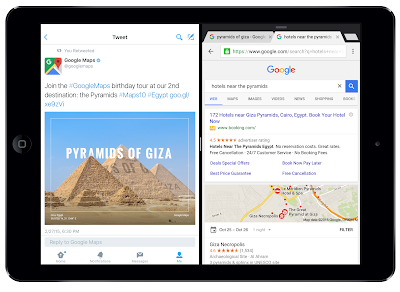Google is getting louder about wanting Firefox users to switch their default browser back to its search engine.
As you may know, Mozilla replaced Google with Yahoo as the default search provider in Firefox in the United States back in November. This led to Yahoo gaining some market share in the months after.
Unfortunately for Yahoo, that growth seems to have stalled. Based on data from StatCounter, Google hit its lowest share in the U.S. in January, while Yahoo reached its highest in over five years. That Yahoo growth flatlined in February, however, though the search engine was mostly able to hang on to the additions it already made.

Since Yahoo and Mozilla made the deal, Yahoo has been displaying a message at the top of its homepage and other properties, encouraging users to “upgrade to the new Firefox”.

Google has also been displaying messages trying to get users to switch their default search experience back to Google Search for a while. In January, it put out this little video guide:
Google also started telling Firefox users who visited its homepage to set the default experience back to Google with a message saying, “Get to Google faster. Make Google your default search engine.”

Now, Google is taking things up a notch. It’s actually showing big ad-like messages at the top of unrelated search results pages, telling users to switch search engines:

If you click “learn how,” you’re presented with this:

If you click “no thanks,” it just disappears. If you ignore Google’s prompt, it goes away after two or three searches.
Search Engine Land describes this strategy as “begging” and “desperate” on Google’s part.
Outgoing Google CFO Patrick Pichette was asked about Yahoo’s partnership with Mozilla on Google’s recent earnings call. He said:
You’ve all heard the announcements about Mozilla. And so when we don’t comment on the details of any of our partnerships that we have, having said that, we continue to do two things that really matter. One is our users continue to actually go in, if they love Google, they will continue to find Google, whichever platform, whichever browser, and that’s really what we’ve focused on doing.
And then the second piece is the way to win this in the long-term, right? It’s very simple. You just make wonderful products. And when you make wonderful products that are magical people will find them….partnerships matter. But at the core of it, you need partnership, because you have a phenomenal product. And that’s what we’re going to continue to build this amazing company.
It’s interesting to see how far Google is going to get Firefox users to switch back. Soon, it could be implementing a similar strategy in Apple’s Safari browser. Google’s deal with Apple to remain the default search experience there is set to expire soon. We don’t know exactly when, but we know it’s soon.
It’s possible that Apple could go with Google again, but speculation that it will go with another search engine like Yahoo or Bing (at least in the U.S.) has been picking up. Yahoo and Microsoft have both been said to be ready to battle for the spot. On Yahoo’s earnings call, CEO Marissa Mayer was pretty clear about really wanting to have Yahoo as the default on Safari. She said:
The Safari platform is basically one of the premiere search engine in the world, if not the premiere search engine in the world. We are definitely in the search distribution business. I think we stated that really clearly in the past and I think with Mozilla and also in addition we brought Amazon and eBay onboard with smaller distribution partnerships in Q4, we are in search distribution business and anyone who is in that business needs to be interested in the Safari deal.
The Safari users are among the most engaged and lucrative users in the world and it’s something that we would really like to be able to provide. We work really closely with Mozilla to ultimately bring to their users an experience that they designed and that they feel really suit those users and we welcome the opportunity with any other partner to do the same, particularly one with Apple’s volume and end user base.
As Kara Swisher, who was liveblogging the event, said, “Mayer appeared to practically salivate at the prospect if Apple throws over Google for someone else. Issue: Microsoft. Another issue: Yahoo search technology would have to be majorly upgraded.”
Earlier this week, Search Engine Land’s Greg Sterling predicted that Apple will not renew its Google deal (again, at least in the U.S.), saying both parties have reasons not to renew. He wrote:
In 2011, Macquarie Capital estimated that Google earned $1.3 billion in search-related revenue from its default position on Safari. Of that, Google was supposed to have paid Apple over a billion dollars. In 2013, Morgan Stanley also estimated that Google paid Apple over $1 billion annually for the privilege of being the Safari default.
If these figures were correct at the time, they’re likely out-of-date today. If anything, there’s more mobile search volume and more revenue than in 2011 or 2013. Google’s net profit from Safari is substantially less than the $1 billion it probably pays Apple. Google is therefore probably willing to bet that its net will go up if it walks away from the deal.
He also noted that Google probably assumes it will get users to switch back and/or get them using its search app. It most likely would get many users back, and it would also most likely implement an aggressive switchback campaign as it’s doing in Mozilla. Still, it’s going to be an interesting narrative to watch.


























